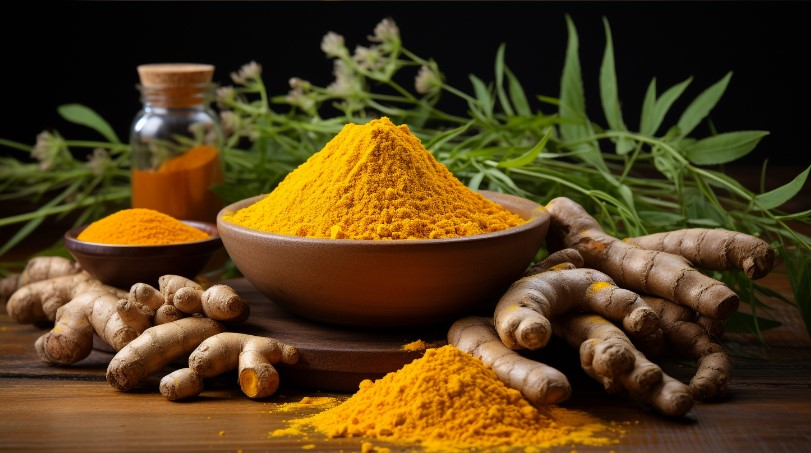항암 및 항산화-강황 뿌리 추출물 커큐민

무엇 Turmeric Root Extract curcumin?
Curcumin is a natural compound with good anti-inflammatory and anti-cancer properties. Curcumin is a diketone compound extracted from the rhizomes of some plants in the Zingiberaceae and Araceae families. Its chemical formula is C21H20O6. Among them, turmeric contains about 3% to 6% curcumin, which is a rare pigment with a diketone structure in the plant kingdom. Curcumin is an orange-yellow crystalline powder with a slightly bitter taste and is insoluble in water. It is mainly used in food production to color sausage products, canned food, sauce-braised products and other products. Curcumin has hypolipidemic, anti-tumor, anti-inflammatory, choleretic, and antioxidant effects. In addition, some scientists have found that curcumin can help treat drug-resistant tuberculosis. [1]
If you’re aware of the “turmeric craze” that has been growing in intensity over the past few years, you must have heard of curcumin. Curcumin is a yellow pigment extracted from the rhizome of turmeric. Turmeric is not the ginger that we usually see everywhere in the market, but a traditional Chinese medicine with a similar appearance and yellow skin (as shown below). “Compendium of Materia Medica” describes it as: Turmeric also enters the spleen and treats qi. This medicine is common in India, because Indian traditional medicine believes that turmeric can treat various diseases such as infections, digestive system diseases, arthritis, etc., so turmeric has been passed down as a daily condiment.
무엇을 Turmeric Root Extract curcumin do?
Turmeric is a commonly used medicine, and its main bioactive components are curcuminoids and volatile oils. The former has hypolipidemic, anticoagulant, antioxidant, choleretic, and anticancer effects; while the latter mainly has anti-inflammatory, antibacterial, and antitussive effects. Curcuminoids exert their anti-cancer effects by inducing the differentiation of malignant tumor cells, inducing tumor cell apoptosis and inhibiting tumor growth at various stages, and are widely used clinically.
항암
Curcumin is a plant polyphenol extracted from turmeric, and it is also the most important active ingredient in turmeric’s pharmacological effects. Research in recent years has not only proven the traditional effects of turmeric, but also revealed some new pharmacological effects, such as anti-inflammatory, antioxidant, scavenging oxygen free radicals, anti-human immunodeficiency virus, liver and kidney protection, anti-fibrosis and anti-cancer Its anti-cancer effects may be related to its inhibition of the activation and expression of transcription factors such as nuclear factor-κB and activator protein-1, and it has no obvious toxic side effects.
Alzheimer’s disease
Animal experiments at Duke University in the United States showed that the curcumin in curry not only decomposes amyloid protein in the brains of experimental mice, but also prevents the production of this protein. Researchers pointed out that regular consumption of curry may also produce similar effects in people, thereby helping to prevent Alzheimer’s disease.
Many studies have proven that the accumulation of amyloid protein in the brain is one of the main causes of Alzheimer’s disease. Previous research has shown that curcumin, the key ingredient in curry, can prevent brain nerve cell damage and improve brain nerve cell function.
According to US media reports, researchers at Duke University in the United States genetically modified experimental mice to produce many amyloid proteins in their brains. The researchers then fed the mice a diet rich in curcumin and found that amyloid broke down in the brains of the mice. The same diet also prevented the development of amyloid in the brains of the mice as adults.
항염증제
Inflammation is a complex process that is triggered by cell infection and/or tissue damage, resulting in a series of chain reactions that ultimately lead to the rapid development of certain chronic diseases. Given that inflammation plays an important role in most chronic diseases, anti-inflammatory drugs are needed to prevent it. Although several different steroidal and nonsteroidal anti-inflammatory drugs such as semicoxib, aspirin, ibuprofen, phenylbutazone, etc. can be used to treat inflammatory diseases, most of them have side effects. Studies have found that curcumin’s anti-inflammatory activity is comparable to steroidal and non-steroidal drugs such as indomethacin and phenylbutazone, and is safe in most cases.
Curcumin has antioxidant, anti-inflammatory, free radical scavenging and anti-cancer effects. 커큐민 is a nutritional pigment extracted from plants, which can increase the body’s resistance and treat various inflammatory and infectious diseases. Curcumin can promote the activity of the body’s own antioxidant enzymes and significantly improve the body’s antioxidant capacity; it can inhibit platelet aggregation, reduce plasma viscosity and whole blood viscosity, and has an inhibitory effect on bacteria; it affects the cycle, development and molecular level spread of cancer cells , promote cancer cell death. Turmeric’s primary benefit for the heart is its ability to promote endothelial function and reduce the risk of heart disease. Please follow your doctor’s advice when taking it!
[1] Scientists have newly discovered that curcumin can help treat drug-resistant tuberculosis.Netease News
() ()